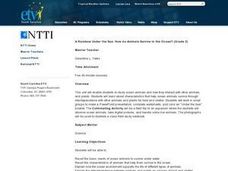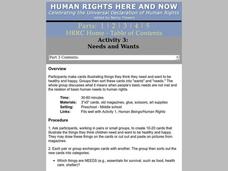Curated OER
How Can We Keep Our Forests Intact and Have Our Chocolate Too?
Fourth graders explore various methods of growing and harvesting rainforest foods in order to sustain its biodiversity. They discuss the various uses for trees from several viewpoints. Students research chocolate demand and land use...
Calvin Crest Outdoor School
Survival
Equip young campers with important survival knowledge with a set of engaging lessons. Teammates work together to complete three outdoor activities, which include building a shelter, starting a campfire, and finding directions in the...
Arizona-Sonora Desert Museum
Desert People and the Saguaro
The saguaro is the focus of an examination of the importance of this stately cactus to the indigenous people in the Sonoran Desert.
Curated OER
Obesity, Eating Habits and Weight Loss
Learners conduct Internet research, view film and participate in class discussion to identify the problem and causes of obesity in America. They evaluate the food pyramid and break down the nutritional components of fast food and frozen...
Curated OER
A Balanced Diet
Young scholars determine which healthy foods comprise a well balanced meal. Using a checklist, students classify foods as healthy or unhealthy. This instructional activity is intended for young scholars acquiring English.
Curated OER
Starvation in the Ghettos
Students investigate how human beings survive under camp and ghetto life's extreme condition while understanding the USRDA requirements. They recognize the suffering and loss of life due to the lack of adequate nutrition.
Curated OER
The Brown Rice Bonus
Students investigate how brown rice can be incorporated into a daily healthy diet. They practice preparing and storing the rice in the most beneficial ways. Also goals are set to increase the consumption of it in the dose of twice a week.
Curated OER
Protein Puzzles
Learners examine the concept of protein structure. They read an article, construct a three-dimensional model of an insulin protein, take a quiz, conduct Internet research, and answer discussion questions.
Curated OER
Farming in a Fishbowl: How Ethnic Groups in
Seventh graders research Chinese agricultural needs and practices. They conduct an experiment with aquaculture and germinated rice as they take measurements and apply the scientific method.
Curated OER
Outdoor Survival
Students are introduced to basic outdoor survival concepts. They identify the seven basic needs for survival. Students describe the symptoms and treatment for frostbite and hypothermia. They compare and contrast the value of different...
Curated OER
Hunters/Gatherers
Students discuss the ways in which an environment is used to provide the basic necessities of life. In groups, they compare and contrast how different hunter and gatherer groups have used the environment to their advantage. They place...
Curated OER
Caribbean Culture Day
Students are introduced to about Caribbean culture through the preparation and sampling of Caribbean food, as well as become familiar with Caribbean folk songs and poetry. They also experience blindness in order to form a deeper...
Curated OER
Make Waves
Sixth graders discover, through exploration, the basic characteristics of waves. After a lecture/demo, 6th graders work in groups and participate in a series of labs where they investigate waves. Each group presents its findings to the...
Curated OER
A Rainbow Under the Sea: How do Animals Survive in the Ocean?
Second graders read books, watch videos, complete worksheets and participate in class discussions about ocean animals. They, in groups, design PowerPoint presentations on selected marine animals.
Curated OER
Needs And Wants
Students make cards illustrating things they think they need and want to be healthy and happy. Groups then sort these cards into "wants" and "needs." The whole class discusses what it means when people's basic needs are not met and the...
Curated OER
Edible Soil
Students model the soils layers using Oreo's. In this lesson students use their favorite food items to create a model of soil layers. A discovery lesson from a youth camp is adapted for classroom modeling and discussion of soil...
Curated OER
Free Enterprise -- Product Cost
Students are introduced to the concept of free enterprise. In groups, they discuss the price of various food items and decide on which item to produce. They calculate the cost of producing the item and share their results with the class.
Curated OER
Leavening
Students experiment with the various types of leavening agents and complete a muffin lab. They review the basics of lab management and safety procedures: sanitation, measuring, altering recipes, table setting and mealtime manners, basic...
Curated OER
Growth and Changes in Plants
Students investigate the growth and changes in plants. They view a video and discuss the changes in plants. They work in small groups to demonstrate vocabulary words to the class. They visit a green house and take pictures of plants to...
Curated OER
Magnets, Electromagnets, and Motors
Young scholars investigate the concepts of magnetism and its properties. They construct a magnet and test foods for iron content. Then students define the use of a motor and make their own electric motor while working in small groups....
Curated OER
Living and Non-Living
Students discover the basic needs of life. In this science lesson plan, students explore how all living things need air, water, food and shelter
Curated OER
Milk and Dairy, Day 1
Students review different types of milk products and their characteristics, demonstrate how to select and prepare milk and milk products, identify standard serving sizes, define terms associated with milk and milk products, and practice...
Curated OER
Black Hawk Island Hike
Students explore Wisconsin's natural and cultural history through hands-on exploration of Upham Woods. They are shown the basic paddling skills and they work in teams to paddle across the river on barge. Students describe cultural...
Curated OER
57 Varieties of Interdependence
Students examine the life of Henry J. Heinz and how he began his career in food service. For this economic history lesson,students study how Henry J. Heinz started his business. Students will create and answer key...

























